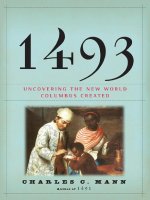Lesley hazleton after the prophet the epic st lam (v5 0)
Bạn đang xem bản rút gọn của tài liệu. Xem và tải ngay bản đầy đủ của tài liệu tại đây (1.17 MB, 159 trang )
ALSO BY LESLEY HAZLETON
Jezebel: The Untold Story of the Bible’s Harlot Queen
Mary: A Flesh-and-Blood Biography of the Virgin Mother
Jerusalem, Jerusalem: A Memoir of War and Peace, Passion and Politics
Where Mountains Roar: A Personal Report from the Sinai Desert
Israeli Women: The Reality Behind the Myths
Contents
Note on Usage and Spelling
Map: The Middle East in the Late Seventh Century
PROLOGUE
PART ONE
MUHAMMAD
PART TWO
ALI
PART THREE
HUSSEIN
Acknowledgments
Notes
Sources
Note on
Usage and Spelling
Throughout this book, I have used rst names for major gures rather than full names,
in order to avoid the “Russian novel e ect,” where English readers su er the confusion
of multiple unfamiliar names. Thus, for instance, I have used Ali instead of Ali ibn Abu
Talib, Aisha instead of Aisha bint Abu Bakr, Omar instead of Omar ibn al-Khattab, and
so on. I have used fuller names only where there is a risk of confusion; thus, the son of
the first Caliph, Abu Bakr, is referred to as Muhammad Abu Bakr, itself abbreviated from
Muhammad ibn Abu Bakr.
I have used the spelling “Quran” instead of the more familiar English rendering
“Koran” for the sake of both accuracy and consistency, and in order to respect the
di erence between the Arabic letters qaf and kaf. Otherwise, wherever possible, I have
used more familiar English spellings for the names of major gures (Othman, for
instance, instead of Uthman or Uttman, and Omar instead of Umar) and have purposely
omitted diacritical marks, using Shia rather than Shi’a, Ibn Saad instead of Ibn Sa’d,
Muawiya instead of Mu’awiya, Quran instead of Qur’an.
Prologue
THE SHOCK WAVE WAS DEAFENING. IN THE FIRST FEW SECONDS after the blast, the millions of pilgrims were
rooted to the spot. Everyone knew what had happened, yet none seemed able to
acknowledge it, as though it were too much for the mind to process. And then as their
ears began to recover, the screaming began.
They ran, panicked, out of the square and into the alleys leading to the gold-domed
mosque. Ran from the smoke and the debris, from the blood and shattered glass, the
severed limbs and battered bodies. They sought security in small, enclosed spaces, a
security obliterated by the next blast, and then the next, and the next.
There were nine explosions in all, thirty minutes of car bombs, suicide bombs,
grenades, and mortar re. Then there was just the terrible stench of burned esh and
singed dust, and the shrieking of ambulance sirens.
It was midmorning on March 4, 2004—the tenth of Muharram in the Muslim
calendar, the day known as Ashura. The city of Karbala was packed with Shia pilgrims,
many of whom had journeyed on foot the fty miles from Baghdad. They carried huge
banners billowing above their heads as they chanted and beat their chests in ritualized
mourning for the Prince of Martyrs, Muhammad’s grandson Hussein, who was killed in
this very place. Yet there was an air of celebration too. The mass pilgrimage had been
banned for years; this was the rst time since the fall of the Saddam regime that they
had been able to mourn proudly and openly, and their mourning was an expression of
newfound freedom. But now, in a horrible reverse mirror of the past, they too had been
transformed into martyrs.
The Ashura Massacre, they would call it—the rst major sign of the civil war to come.
And on everyone’s lips, the question, How had it come to this?
The Sunni extremist group Al Qaida in Iraq had calculated the attack with particularly
cruel precision. When and where it took place were as shocking as the many hundreds
of dead and wounded. Ashura is the most solemn date in the Shia calendar—the
equivalent of Yom Kippur or Easter Sunday—and the name of Karbala speaks of what
happened on this day, in this place, in the year 680. It is a combination of two words in
Arabic: karab, meaning destruction or devastation, and bala, meaning tribulation or
distress.
Muhammad had been dead not fty years when his closest male descendants were
massacred here and the women of his family taken captive and chained. As word of the
massacre spread, the whole of the Muslim world at the time, from the borders of India in
the east to Algeria in the west, was in shock, and the question they asked then was the
same one that would be asked fourteen centuries later: How had it come to this?
What happened at Karbala in the seventh century is the foundation story of the SunniShia split. Told in vivid and intimate detail in the earliest Islamic histories, it is known
to all Sunnis throughout the Middle East and all but engraved on the heart of every Shia.
It has not just endured but gathered emotive force to become an ever-widening spiral in
which past and present, faith and politics, personal identity and national redemption
are inextricably intertwined.
“Every day is Ashura,” the Shia say, “and every place is Karbala.” And on March 4,
2004, the message was reiterated with terrifying literalness. The Karbala story is indeed
one without end, still unfolding throughout the Muslim world, and most bloodily of all
in Iraq, the cradle of Shia Islam.
This is how it happened, and why it is still happening.
chapter 1
IF THERE WAS A SINGLE MOMENT IT ALL BEGAN, IT WAS THAT OF Muhammad’s death. Even the Prophet was
mortal. That was the problem. It was as though nobody had considered the possibility
that he might die, not even Muhammad himself.
Did he know he was dying? He surely must have. So too those around him, yet nobody
seemed able to acknowledge it, and this was a strange blindness on their part.
Muhammad was sixty-three years old, after all, a long life for his time. He had been
wounded several times in battle and had survived no fewer than three assassination
attempts that we know of. Perhaps those closest to him could not conceive of a mere
illness bringing him down after such concerted malice against him, especially now that
Arabia was united under the banner of Islam.
The very people who had once opposed Muhammad and plotted to kill him were now
among his senior aides. Peace had been made, the community united. It wasn’t just the
dawn of a new age; it was morning, the sun bright, the day full of promise. Arabia was
poised to step out of the background as a political and cultural backwater and take a
major role on the world stage. How could its leader die on the verge of such success? Yet
dying he de nitely was, and after all the violence he had seen—the battles, the
assassination attempts—he was dying of natural causes.
The fever had begun innocuously enough, along with mild aches and pains. Nothing
unusual, it seemed, except that it did not pass. It came and went, but each time it
returned, it seemed worse. The symptoms and duration—ten days—seem to indicate
bacterial meningitis, doubtless contracted on one of his military campaigns and, even
today, often fatal.
Soon blinding headaches and wrenching muscle pain weakened him so much that he
could no longer stand without help. He began to drift in and out of sweat-soaked
semiconsciousness—not the radiant trance in which he had received the Quranic
revelations but a very di erent, utterly debilitating state of being. His wives wrapped
his head in cloths soaked in cold water, hoping to draw out the pain and reduce the
fever, but if there was any relief, it was only temporary. The headaches grew worse, the
throbbing pain incapacitating.
At his request, they had taken him to the chamber of Aisha, his favorite wife. It was
one of nine built for the wives against the eastern wall of the mosque compound, and in
keeping with the early ethic of Islam—simplicity, no inequalities of wealth, all equal as
believers—it was really no more than a one-room hut. The rough stone walls were
covered over with reed roo ng; the door and windows opened out to the courtyard of
the mosque. Furnishings were minimal: rugs on the oor and a raised stone bench at the
back for the bedding, which was rolled up each morning and spread out again each
night. Now, however, the bedding remained spread out.
It was certainly sti ing in that small room even for someone in full health, for this
was June, the time when the desert heat builds to a terrible intensity by midday.
Muhammad must have struggled for each breath. Worst of all, along with the headaches
came a painful sensitivity to noise and light. The light could be dealt with: a rug hung
over the windows, the heavy curtain over the doorway kept down. But quiet was not to
be had.
A sickroom in the Middle East then, as now, was a gathering place. Relatives,
companions, aides, supporters—all those who scrambled to claim closeness to the center
of the newly powerful religion—came in a continual stream, day and night, with their
concerns, their advice, their questions. Muhammad fought for consciousness. However
sick, he could not ignore them; too much depended on him.
Outside, in the courtyard of the mosque, people were camped out, keeping vigil. They
refused to believe that this illness could be anything but a passing trial, yet they were in
a terrible dilemma, for they had seen too many people die of just such sickness. They
knew what was likely to happen, even as they denied it. So they prayed and they
waited, and the sound of their prayers and concern built to a constant, unrelenting hum
of anxiety. Petitioners, followers, the faithful and the pious, all wanted to be where
news of the Prophet’s progress would be heard rst—news that would then spread by
word of mouth from one village to another along the eight-mile-long oasis of Medina,
and from there onto the long road south to Mecca.
But in the last few days, as the illness worsened, even that steady murmur grew
hushed. The whole of the oasis was subdued, faced with the inconceivable. And hovering
in the air, on everyone’s mind but on nobody’s lips, at least in public, was the one
question never asked out loud. If the impossible happened, if Muhammad died, who
would succeed him? Who would take over? Who would lead?
It might all have been simple enough if Muhammad had had sons. Even one son.
Though there was no strict custom of a leader’s power passing on to his rstborn son at
death—he could always decide on a younger son or another close relative instead—the
eldest son was traditionally the successor if there was no clear statement to the
contrary. Muhammad, however, had neither sons nor a designated heir. He was dying
intestate—abtar, in the Arabic, meaning literally curtailed, cut o , severed. Without
male offspring.
If a son had existed, perhaps the whole history of Islam would have been di erent.
The discord, the civil war, the rival caliphates, the split between Sunni and Shia—all
might have been averted. But though Muhammad’s rst wife, Khadija, had given birth to
two sons alongside four daughters, both had died in infancy, and though Muhammad
had married nine more wives after her death, not one had become pregnant.
There was surely talk about that in Medina, and in Mecca too. Most of the nine
marriages after Khadija had been political; as was the custom among all rulers of the
time, they were diplomatic alliances. Muhammad had chosen his wives carefully in
order to bind the new community of Islam together, creating ties of kinship across tribes
and across old hostilities. Just two years earlier, when Mecca had nally accepted Islam
and his leadership, he had even married Umm Habiba, whose father had led Mecca’s
long and bitter opposition to him. But marital alliances were sealed by children. Mixed
blood was new blood, free of the old divisions. For a leader, this was the crucial point of
marriage.
Most of Muhammad’s wives after Khadija did indeed have children, but not by him.
With the sole exception of the youngest, Aisha, they were divorcées or widows, and their
children were by previous husbands. There was nothing unusual in this. Wealthy men
could have up to four wives at the same time, with Muhammad allowed more in order to
meet that need for political alliance, but women also often had two, three, or even four
husbands. The di erence was that where the men had many wives simultaneously, the
women married serially, either because of divorce—women divorced as easily as men at
the time—or because their previous husbands had died, often in battle.
This meant that the whole of Mecca and Medina was a vast interlocking web of
kinship. Half brothers and half sisters, in-laws and cousins, everyone at the center of
Islam was related at least three or four di erent ways to everyone else. The result
beggars the modern Western idea of family. In seventh-century Arabia, it was a farreaching web of relationships that de ed anything so neatly linear as a family tree. It
was more of a dense forest of vines, each one spreading out tendrils that then curled
around others only to fold back in on themselves and reach out again in yet more
directions, binding together the members of the new Islamic community in an intricate
matrix of relationship no matter which tribe or clan they had been born into. But still,
blood mattered.
There were rumors that there was in fact one child born to Muhammad after Khadija
—born to Mariya the Copt, an Egyptian slave whom Muhammad had freed and kept as
a concubine, away from the mosque compound—and that indeed, the child had been a
boy, named Ibrahim, the Arabic for Abraham. But unlike the ancestor for whom he was
named, this boy never grew to adulthood. At seventeen months old, he died, and it
remains unclear if he ever actually existed or if, in a culture in which sons were
considered a sign of their fathers’ virility, he was instead a kind of legendary assurance
of the Prophet’s honor.
Certainly any of the wives crowded around Muhammad’s sickbed would have given
her eyeteeth—all her teeth, in fact—to have had children by him. To have been the
mother of his children would have automatically granted her higher status than any of
the other wives. And to bear the son of the Prophet? His natural heir? There could be no
greater honor. So every one of them surely did her utmost to become pregnant by him,
and none more than Aisha, the first wife he had married after the death of Khadija.
The youngest of the nine, the favorite, and by far the most controversial, Aisha was
haunted by her childlessness. Like the others, she must certainly have tried, but in vain.
Perhaps it was a sign of Muhammad’s ultimate loyalty to the memory of Khadija, the
woman who had held him in her arms when he was in shock, trembling from his rst
encounter with the divine—the rst revelation of the Quran—and assured him that he
was indeed Rasul Allah, the Messenger of God. Perhaps only Khadija could be the
matriarch, and only her eldest daughter, Fatima, could be the mother of Muhammad’s
treasured grandsons, Hasan and Hussein.
There can be no question of impotence or sterility on Muhammad’s part; his children
by Khadija were proof of that. No question either of barrenness on the part of the later
wives, since all except Aisha had children by previous husbands. Perhaps, then, the
multiply married Prophet was celibate. Or as Sunni theologians would argue in centuries
to come, perhaps this late-life childlessness was the price of revelation. The Quran was
the last and nal word of God, they said. There could be no more prophets after
Muhammad, no male kin who could assert special insight or closeness to the divine will,
as the Shia would claim. This is why Khadija’s two infant boys had to die; they could not
live lest they inherit the prophetic gene.
All we know for sure is that in all nine marriages after Khadija, there was not a single
pregnancy, let alone a son, and this was a major problem.
Muhammad was the man who had imposed his will—the will of God—on the whole of
the vast Arabian Peninsula. He had done it in a mere two decades, since the angel
Gabriel’s rst appearance to him. Iqra, “recite,” the angel had told him, and thus the
stirring opening lines of the Quran—“the Recitation”—came into being. Further
revelations had come steadily, and in the most beautiful Arabic anyone had ever heard,
transcendent poetry that was taken as a guarantee of its divine origin, since surely no
illiterate trader like Muhammad was capable of creating such soul-stirring beauty on his
own. He was literally the Messenger, the man who carried the revealed word of God.
As Islam spread through the towns, oases, and nomadic tribes of Arabia, they had all
prospered. The accrued wealth of taxes and tribute was now that of the Islamic
community as a whole. But with a public treasury and publicly owned lands, it was all
the more important that their leader leave a will—that he designate his successor or at
least establish clear guidelines for how his successor was to be determined.
What did he intend to happen after his death? This is the question that will haunt the
whole tragic story of the Sunni-Shia split, though by its nature, it is unanswerable. In
everything that was to follow, everyone claimed to have insight into what the Prophet
thought and what he wanted. Yet in the lack of a clear and unequivocal designation of
his successor, nobody could prove it beyond any shadow of doubt. However convinced
they may have been that they were right, there were always those who would maintain
otherwise. Certainty was a matter of faith rather than fact.
It is clear that Muhammad knew that he would die, if not quite yet. He had no
illusions of his own immortality. True, he was still full of vitality—his gait had been
strong until the illness struck, his build solid and muscular, and only a close observer
could have counted the few white strands in what was still a full head of dark, braided
hair—but those three assassination attempts must have made him more aware than most
that his life could be cut short. On the other hand, a close brush with death is sometimes
the renewed impetus for life. Indeed, the most serious of those attempts to kill him had
been a major turning point in the establishment of Islam.
That had been ten years earlier, when his preaching had so threatened the aristocrats
of his native Mecca. His message was a radical one, aimed above all at the inequities of
urban life, for despite the prevailing image of seventh-century Arabia as nomadic, most
of its population had been settled for several generations. Social identity was still tribal,
however; your status was determined by what tribe you were born into, and no tribe
was wealthier or more powerful than the Quraysh, the urban elite of Mecca.
The Quraysh were merchant traders, their city a central point on the north-south trade
route that ran the length of western Arabia. It had become so central less because of any
geographical advantage—if anything, it involved a slight detour—than because it was
home to the Kaaba. This cube-shaped shrine housed numerous regional deities, many of
them said to be o spring of a higher, more remote deity known simply as Allah, “the
God.” Mecca was thus a major pilgrimage center, and since intertribal rivalries were
suspended within its walls during pilgrimage months, it also provided a safe venue for
large trading fairs.
This combination of pilgrimage and commerce proved highly pro table. The Quraysh
skillfully melded faith and nance, charging fees for access to the Kaaba, tolls on trade
caravans, and taxes on commercial transactions. But the wealth they generated was not
shared by all. The traditional tribal principle of caring for all its members had not
survived the passage into urban life, so that while some clans within the tribe prospered,
others did not. It was these others with whom Muhammad’s message would rst
resonate.
The poor, the orphaned, the enslaved—all were equal in the eyes of God, Muhammad
taught. What tribe you were born to, what clan within that tribe, what household within
that clan—none of this mattered. No one group had the right to raise itself up above
others. To be Muslim—literally to submit yourself to God’s will—was to forsake all the
old divisiveness. It meant no more tribe against tribe or rich against poor. They were
one people, one community, bound together in the simple but stunning
acknowledgment that there was no god but God.
It was an egalitarian message, as revolutionary in its time and place as that of an
earlier prophet in rst-century Palestine. And to those who controlled the city’s wealth,
it was downright subversive, a direct challenge to the status quo of power. As
Muhammad’s following increased, the Meccan elite had done all they could to silence
him, but everything they tried, from vili cation to boycott, had failed. Finally, a group
of leading Meccans, one from every major clan of the Quraysh, banded together in the
dark outside Muhammad’s house, knives at the ready, waiting for him to emerge for
dawn prayers. Warned of the plot just in time, he ed Mecca under cover of night along
with a single companion and headed for the oasis city of Medina to the north, where he
was welcomed rst as a peacemaker between feuding tribes, then as a leader. The year
of his nighttime
ight for refuge—the hijra, or emigration—would become the
foundation year of the Islamic calendar: 622 A.D., or the year One A.H., After the Hijra.
Under Muhammad, the oasis city became the political center of Arabia, threatening to
eclipse Mecca to the south. The power struggle between the two cities would include two
major battles and countless skirmishes, but eight years after forcing Muhammad out,
Mecca had nally accepted his leadership. The fatah, they would call it, the “opening” of
the city to Islam. The Kaaba had been rededicated to the one God, Allah, and
Muhammad had acted on his message of unity by reaching across the aisle, as it were,
and welcoming many of the Meccan elite into the leadership of Islam.
Friends could be as dangerous as long-term enemies, though. Muhammad certainly
knew that assassination could also be used by those closest to you. Throughout the world
of the time, it had long been a prime pathway to power. Appoint your successor, and
that appointee, no matter how trusted, might always be tempted to speed up events, to
preempt the natural life cycle by arti cial means. A carefully crafted poison in a
honeyed drink or a dish of succulent lamb? Such things were not unknown. In fact, they
were soon to become all too familiar.
But what is most likely is that Muhammad knew that the moment he formally
appointed a successor, he would be introducing divisiveness into the newly united
community of Islam—or, rather, feeding into the divisiveness that already existed. He
would set in motion the web of resentments and jealousies that had accumulated as
people jockeyed for in uence and position, as they will around any man of charisma,
let alone a prophet. However hard he may have tried to smooth them over,
disagreements that had merely simmered beneath the surface would become all too
visible. Factions would form, arguments develop, his whole life’s work teeter on the
edge of collapse. Perhaps that was inevitable, and he simply could not bring himself to
endorse the inevitable. He had put an end to intertribal warfare; he had empowered the
powerless; he had overthrown the old aristocracy of Mecca, expelled the old pagan gods,
and founded the world’s third great monotheistic faith. He had achieved what had
seemed the impossible, but could the impossible survive him?
There are signs that Muhammad was all too aware of what would happen after his
death. One tradition has it that his last words were: “Oh God, have pity on those who
succeed me.” But then what did he mean by that? Was it an expression of humility? Or
perhaps an invocation to the one God to help his people? Or did Muhammad, with his
nal breath, foresee the terrible saga of blood and tears to come? There is no way of
knowing. As the old Arabic saying has it, “Only God knows for sure.” Words are always
subject to interpretation. Thoughts can only be imagined, and that is the work of
novelists. We have to rely on the basic stu of history, the accounts of those who were
there. And each one had his or her own angle, his or her own interest in the outcome.
Sunni scholars would argue in centuries to come that Muhammad had such faith in the
goodwill and integrity of all Muslims that he trusted to them, and to God, to ensure that
the right decision be made. He saw the community itself as sacred, these scholars would
argue, meaning that any decision it made would be the correct one. But Shia scholars
would maintain that Muhammad had long before made the divinely guided choice of his
closest male relative—his son-in-law Ali—as his successor. He had done so many times,
in public, they would say, and if Ali’s enemies had not thwarted the Prophet’s will, he
would certainly have done so again, one last time, as he lay dying in that small chamber
alongside the mosque.
In those ten nal days of Muhammad’s life, everyone who plays a major role in this
story was in and out of that sickroom, in particular one woman and ve men, each of
them a relative, and each with a direct interest in the matter of who would succeed the
Prophet. The men included two of his fathers-in-law, two of his sons-in-law, and a
brother-in-law, and indeed all ve would eventually succeed him, claiming the title of
Caliph—the khalifa, or successor, of Muhammad. But how that would happen, and in
what order, would be the stuff of discord and division for fourteen centuries to come.
Whatever divisions may have existed between the men as Muhammad lay dying,
however, they paled compared with that between Aisha, the childless favorite whose
room they were in, and Ali, the youngest of the ve men. As Muhammad’s rst cousin
and his adopted son as well as his son-in-law, he was the Prophet’s nearest male
relative. Yet Aisha and Ali, the two people closest of all to Muhammad on a daily basis,
had barely been able to speak a civil word to each other for years, even in his presence.
The tension between the two surely made the air in that sickroom all the more
sti ing, yet it seemed that not even the Prophet could foresee how their mutual
animosity would determine the future of Islam. After all, how could something as
seemingly small as a necklace lost seven years earlier have set the scene for the
centuries of division that lay ahead?
chapter 2
IT WAS NOT JUST ANY NECKLACE, THOUGH IT WOULD HAVE BEEN easy enough to think so, for it was really no
more than a string of beads. They may have been agates, or coral, or even simple
seashells—Aisha never did say, and one can almost see her waving her hand
dismissively, as though such detail were irrelevant. Perhaps she was right, and it’s
enough to know that it was the kind of necklace a young girl would wear, and treasure
more than if it had been made of diamonds because it had been Muhammad’s gift to her
on her wedding day.
Its loss and the ensuing scandal would be known as the A air of the Necklace, the
kind of folksy title that speaks of oral history, which is how all history began before the
age of the printing press and mass literacy. The People of the Cloak, the Episode of Pen
and Paper, the Battle of the Camel, the Secret Letter, the Night of Shrieking—all these
and more would be the building blocks of early Islamic history. This is history told as
story, which of course it always is, but rarely in such vivid and intimate detail.
For the rst hundred years of Islam, these stories lived not on the page but on the
tongues of those who told them and in the ears and hearts of those who heard them and
remembered them to tell again, the details gathering impact as the years unfolded. This
was the raw material of the early Islamic historians, who would travel throughout the
Middle East to gather these memories, taking great care to record the source of each one
by detailing the chain of communication. The isnad, they called it—the provenance of
each memory—given up front by prefacing each speaker’s account in the manner of “I
was told this by C, who was told it by B, who was told it by A, who was there when it
happened.”
This was the method used by Ibn Ishaq in his biography of Muhammad; by Abu Jafar
al-Tabari in his magisterial history of early Islam, which comes to thirty-nine volumes in
English translation; by Ibn Saad in his sometimes deliciously gossipy collections of
anecdotes; and by al-Baladhuri in his “Lineage of the Nobles.” It is an extraordinarily
open process, one that allows direct insight into how history is communicated and
established, and is deeply respectful of the fact that, Rashomon style, if there were six
people there, they would have six similar but subtly different accounts.
Al-Tabari was Sunni, but his vast history is acknowledged as authoritative by Sunni
and Shia alike. Its length and detail are part and parcel of his method. He visits the
same events again and again, almost obsessively, as di erent people tell their versions,
and the di ering versions overlap and diverge in what now seems astonishingly
postmodern fashion. Al-Tabari understood that human truth is always awed—that
realities are multiple and that everyone has some degree of bias. The closest one might
come to objectivity would be in the aggregate, which is why he so often concludes a
disputed episode with that time-honored phrase “Only God knows for sure.”
Reading these voices from the seventh century, you feel as though you are sitting in
the middle of a vast desert grapevine, a dense network of intimate knowledge defying
the limitations of space and time. As they relate what they saw and what they heard,
what this one said and how that one replied, their language is sometimes shocking in its
pithiness— not at all what one expects from conventional history. It has the smack of
vitality, of real people living in earthshaking times, and it is true to the culture, one in
which the language of curse was as rich and developed as the language of blessing.
Indeed, both curse and blessing figure prominently in what is to come.
The necklace was lost just one day’s journey outside Medina, toward the end of one of
Muhammad’s campaigns to unite Arabia’s tribes under the banner of Islam. These were
full-scale expeditions lasting weeks and even months at a time, and he usually took at
least one of his wives along with him. None was more eager to go than Aisha.
For a spirited city teenager, this was pure excitement. If Medina was not yet a city in
the way we now think of the word—it was more of an agglomeration of tribal villages,
each one clustered around a forti ed manor house—it was urban enough for the
nomadic past to have become a matter of nostalgia. Long poems celebrated the purity of
the desert, softening its harshness with the idea of a spiritual nobility lost in the relative
ease of settled life.
For Aisha, then, these expeditions were romance. There was the thrill of riding out of
the ribbon of green that was Medina, up into the jagged starkness of the mountains that
rose like a forbidding no-go zone between Medina and the vast deserts of central and
northern Arabia. The Hijaz, they called it—the “barrier”—and beyond it stretched more
than seven hundred miles of arid steppe until the land suddenly dipped into the lush
river basin of the place they knew as al-Iraq, from the Persian word for lowlands.
This was Aisha’s chance to discover the fabled purity of the desert, and she must have
savored every detail of it, admiring the way the scouts who led them knew where every
spring was, hidden deep between clefts of rock, every place where a well had been
sunk, every dip in the landscape that held the sudden winter rains to create pools that
would vanish within a few days. They needed no compasses, no maps; the land was in
their heads. They were master travelers.
From her vantage point in her howdah—a canopied cane platform built out from the
camel’s saddle—Aisha saw the vast herds of the camel and horse breeders in the
northern steppes; the date palm oases of Khaybar and Fadak nestled like elongated
emeralds in winding valleys; the gold and silver mines that produced much of the wealth
of the Hijaz; the Beduin warriors of remote tribes, ercely romantic to a city girl. She
watched and listened to the drawn-out negotiations with those tribes that resisted
acknowledging Muhammad and Islam, hoping for a peaceful outcome even as some
other part of her may have hoped the talks would break down so that the only choice
left was the sword and the world devolved into action, men’s voices grown hoarse with
yelling and the air charged with the clang of steel and the acrid tang of blood.
It was on these expeditions that she learned her repertoire of battle cries, spurring on
the men from the rear. The women of seventh-century Arabia were no shrinking violets,
and least of all Aisha, known for her sharp tongue and her wit. She learned to curse the
enemy, to praise her own side’s virility, to urge the men on to new feats of valor as she
would do years later in the thick of battle, even as men were dying all around her. She
knew her invective was unnerving, all the more powerful—eerie, almost—for coming in
the high, shrill, piercing voice she was known for, unmistakably hers. But both her
tongue and her wit would almost fail her now.
It had still been dark when they began to break camp to start the nal leg of the
journey home, using the cool early hours of the day to advantage. In the chilly predawn
half-light, Aisha made her way a hundred yards or so beyond the encampment to relieve
herself behind a spindly bush of broom, as women still do when they’re out in the wild,
looking for a modicum of privacy. She got back to her camel just as the caravan was
preparing to move o , and had already settled into the howdah when she put her
ngers to her throat and her heart skipped a beat—that sudden sense of something
missing, of absence where there should have been presence. Her necklace, her gift from
Muhammad, was gone.
She realized instantly what must have happened. The string had snagged on a branch
and snapped without her noticing, scattering the beads onto the ground. But if she was
quick about it, there was still time to retrieve them. Without a word to anyone, she
slipped down from the howdah and retraced her steps.
Even for someone so determined, though, nding the beads took longer than she’d
foreseen. In the early half-light, every broom bush looked the same, and when she
nally found the right one and knelt down, she had to sift through the piles of dead
needles beneath the bush to nd each bead. Yet nd them she did, one by one, and
returned triumphantly to the camp with the beads tied securely into a knot in the hem of
her smock, only to discover that the camp was no longer there. The whole expedition
had moved on, and she was suddenly alone in the desert.
How it had happened was understandable. Her maid, an Ethiopian slave girl, had
seen her climbing into the howdah, but nobody had seen her slip out again. They had all
assumed she was inside and that since the canopy was drawn, she did not want to be
disturbed, so they had left without her. What was not quite as understandable to most
people was what happened next, or rather, what did not happen next.
Aisha did not run after the caravan, even though the well-trodden route was clear
enough. She did not even walk after it, though it could not have been far ahead. Camels
laden with equipment and supplies do not move fast. It would have been easy to catch
up on foot, especially in the early morning before the sun has gained heat, when the
chill of the desert night still hangs in the air, crisp and refreshing—a matter of an hour
or so at the most.
Instead, in her own words, “I wrapped myself in my smock and then lay down where
I was, knowing that when I was missed they would come back for me.”
It was inconceivable to Aisha that her absence would not be noted, unthinkable that
the caravan would not halt and a detachment be sent back to nd her. As the Prophet’s
wife she assumed a position of privilege. To expect her to catch up on foot was to expect
her to behave like a normal teenage girl, and if there was one thing she would insist on
all her life, it was her exceptionality.
There was the age at which she had married Muhammad, to start with. She had been a
mere child, she later maintained: six years old when she was betrothed to him and nine
years old when the marriage was celebrated and consummated. And though this was
unlikely, few disputed her claim in her lifetime. Indeed, few people cared to dispute
with her at all. As one of the most powerful Caliphs would say many years later, “There
was never any subject I wished closed that she would not open, or that I wished open
that she would not close.”
But if Aisha was indeed married so young, others would certainly have remarked on it
at the time. In fact most reports have her aged nine when she was betrothed and twelve
when she was actually married, since custom dictated that girls not marry until puberty.
But then again, to have been married at the customary age would have made Aisha
normal, and that was the one thing she was always determined not to be.
As she reminded everyone who would listen through to the end of her life—an
enviably long one compared to the other main gures in this story since she would
outlive them all—she was not only Muhammad’s youngest wife but also the purest, the
only one who had been neither a divorcée nor a widow but a virgin at marriage. And
most important of all, she was Muhammad’s favorite.
Humayra—“my little redhead”—he called her, though she was almost certainly not a
natural redhead. If she had been, it would have led to much comment in dark-haired
Arabia; indeed she herself, never shy with words, would have said a lot more about it.
But a double measure of henna would have made her hair glow dark red, as was of
course the purpose. It emphasized her difference.
She had been the rst of the nine wives Muhammad had married after the death of
Khadija—o ered by her father, Muhammad’s close friend and longtime supporter Abu
Bakr, as a means of distracting the Prophet in the depth of his mourning. It was easy to
see why. Bold and irrepressible, she would bring him back to life. By her own account,
at least, she would tease and taunt him and not only get away with it but be loved for
it. Muhammad seemed to have granted her license for girlish mischief, as though he
were a fond father indulging a spoiled daughter, entranced by her sassiness and charm.
Charming she must have been, and sassy she de nitely was. Sometimes, though, the
charm wears thin, at least to the modern ear. The stories Aisha later told of her marriage
were intended to show her in uence and spiritedness, but there is often a de nite edge
to them, a sense of a young woman not to be crossed or denied, of someone who could
all too easily switch from spirited to mean-spirited.
There was the time Muhammad spent too long for Aisha’s liking with another wife,
who had made a “honeyed drink” for him—a kind of Arabian syllabub, probably, made
with egg whites and goat’s milk beaten thick with honey, for which Muhammad had a
particular weakness. When he nally came to her chamber and told her why he had
been delayed, she made a face and, knowing that he was particular about bad breath,
wrinkled her nose in distaste. “The bees that made that honey must have been eating
wormwood,” she insisted, and was rewarded when the next time Muhammad was
offered a honeyed drink, he refused it.
Other times she went further, as when Muhammad arranged to seal an alliance with a
major Christian tribe newly converted to Islam by marrying its leader’s daughter, a girl
renowned for her beauty. When the bride-to-be arrived in Medina, Aisha volunteered to
help prepare her for the wedding and, under the guise of sisterly advice, advised her
that Muhammad would think all the more highly of her if on the wedding night, she
resisted him by saying, “I take refuge with God from thee.” The new bride had no idea
that this was the Islamic phrase used to annul a marriage. All she knew was that the
moment she said it, Muhammad left, and the next day she was bundled unceremoniously
back to her own people.
Aisha, in short, was used to having things her own way, so when she was left behind
in the desert, she saw no reason to expect anything di erent. If there was the slightest
murmur of panic at the back of her mind as the sun rose higher overhead and she took
shelter under a scraggly acacia tree, as the shadow of the tree grew shorter and still
nobody came, she would never have acknowledged it, not even to herself. Of course she
would be missed. Of course someone would be sent for her. The last thing anyone would
expect was that she, the favorite wife of the Prophet, run after a pack of camels like
some Beduin shepherd girl. That would be just too demeaning.
Someone did come, though not a special contingent deputized to search for her, as she
had expected. In fact the expedition sent nobody at all, since they never realized she
was missing, not even after they had reached Medina. In the hubbub of arrival—the
hundreds of camels being unloaded and stabled, the throng of warriors being greeted by
wives and kinsmen—her absence went unnoticed. Her maid assumed she’d slipped down
from the howdah and gone perhaps to see her mother. Muhammad himself would have
been far too busy to think of her. Everyone simply assumed she was someplace else.
So it was Aisha’s good fortune, or perhaps her misfortune, that a certain young
Medinan warrior had been delayed and was riding alone through the heat of the day to
catch up with the main expeditionary force when he saw her lying under that acacia
tree.
His name was Safwan, and in what Aisha would swear was an act of chivalry as pure
as the desert itself, he recognized her immediately, dismounted, helped her up onto his
camel, then led the animal on foot the whole twenty miles to Medina. That was how
everyone in the oasis witnessed the arrival of the Prophet’s wife just before nightfall,
hours behind the main body of the expedition, sitting tall and proud on a camel led by a
good-looking young warrior.
She must surely have sensed that something was wrong as people stared in a kind of
stunned astonishment. Must have noticed how they hung back, with nobody rushing up
to say, “Thanks be to God that you’re safe.” Must have seen how they looked sideways
at each other and muttered as she passed. No matter how upright she sat on Safwan’s
camel, how high she held her head or how disdainful her glare, she must have heard the
tongues start to wag as children ran ahead, spreading the word, and must have known
what that word was.
The sight was too much to resist. The Prophet’s youngest wife traveling alone with a
virile young warrior, parading through the series of villages strung along the valley of
Medina? Word of it ran through the oasis in a matter of hours. A necklace indeed,
people clucked. What could one expect of a childless teenager married to a man in his
late fties? Alone the whole day in the desert with a young warrior? Why had she
simply lain down and waited when she could have caught up with the expedition on
foot? Had it been a prearranged tryst? Had the Prophet been deceived by his spirited
favorite?
Whether anyone actually believed such a thing was beside the point. In the seventh
century as today, scandal is its own reward, especially when it has a sexual aspect. But
more important, this one fed into the existing political landscape of the oasis. What
Aisha and Safwan may or may not have done in the desert was not really the issue. This
was about Muhammad’s reputation, his political standing.
Any slur on Aisha was a slur on her whole family, but especially on the two men
closest to her: the man who had given her in marriage and the man who had taken her.
Her father, Abu Bakr, had been Muhammad’s sole companion on that night ight from
Mecca for the shelter of Medina, and that distinction had helped make him one of the
leading gures among the former Meccans who had made Medina the new power center
of Arabia. The Emigrants, they were called, and right there in the name was the fact
that the Medinans still thought of them as foreign, as Meccans. They were respected,
certainly, but not quite accepted. They still had that whi of outsiders who had come in
and somehow taken over, as though the Medinans themselves had not invited them. So
it was the native Medinans, the ones known as the Helpers, who were especially
delighted by this new development. In the politics of seventh-century Medina, as
anywhere in the world today, the appearance of impropriety was as bad as impropriety
itself.
Even among the Emigrants, though, there were those who thought the Abu Bakr
household needed to be taken down a peg, and especially the young girl who so
evidently thought herself better than anyone aside from the Prophet himself. Among the
women in particular, Aisha was resented. Muhammad’s daughters, let alone his other
wives, were weary of her grandstanding. For the rst time, the young girl so insistent
on standing out, on being exceptional, found herself standing out too much.
There is no doubt that Aisha was innocent of the charges against her. She may have
been young and headstrong, but she also had a highly developed sense of politics. To
risk her whole standing, let alone her father’s, for a passing dalliance? That was out of
the question. The favorite wife of the Prophet consorting with a mere warrior, and one
who wasn’t even from one of the best families? She would never dream of it. Safwan
had behaved as she had expected him to behave, the white knight to her maiden in
distress. To imply anything beyond that was the most scurrilous slander. How could
anyone even think such a thing?
Certainly Muhammad did not. If anything, he must have felt guilty about having left
his young favorite alone in the desert, so at rst he dismissed the rumors, convinced that
they would die down soon enough. But in this he seriously misread the mood of the
oasis.
Overnight, the poets got busy. They were the gossip columnists, the op-ed writers, the
bloggers, the entertainers of the time, and the poems they wrote now were not lyrical
odes, but the other great form of traditional Arabic poetry: satires. Laced with puns and
double entendres, they were irresistibly repeatable, building up momentum the more
they spread. The barbed rhyming couplets acted like lances, verbal attacks all the more
powerful in a society where alliances were made on a promise and a handshake, and
men were literally taken at their word.
Soon the whole oasis was caught up in a fervor of sneering insinuation. At the wells,
in the walled vegetable gardens, in the date orchards, in the inns and the markets and
the stables, even in the mosque itself, up and down the eight-mile length of the Medina
valley, people reveled, as people always have and always will, in the delicious details,
real or imagined, of scandal.
Try as he might, Muhammad could no longer ignore the matter. That Aisha was
innocent was not the point; she had to be seen as innocent. He was well aware that his
power and leadership were not beyond dispute in Medina, while to the south Mecca still
remained in opposition to him and, even after two major battles, would not submit for
another ve years. The scurrilous satirical poems had already reached that merchant
city, where they were received with outright glee.
Muhammad had been placed in a double bind. If he divorced Aisha, he would by
implication be acknowledging that he had been deceived. If he took her back, he risked
being seen as a doting old man bamboozled by a mere slip of a girl. Either way, it
would erode not only his own authority as the leader of Medina but the authority of
Islam itself. Incredible as it seemed, the future of the new faith seemed to hang on a
teenage girl’s reputation.
In the meantime, he banished Aisha from her chamber on the eastern wall of the
mosque courtyard and sent her home to Abu Bakr. There she was kept indoors, away
from prying eyes and ears, while word was put out that she had returned to her father’s
house to recuperate from a sudden illness. Not that the rumormongers were buying it.
Illness, indeed, they said knowingly; she was hiding her face in shame, as well she
might.
For the rst time in her life, nothing Aisha could say—and as one early historian put
it, “she said plenty”—could make any di erence. She tried high indignation, wounded
pride, fury against the slander, but none of it seemed to have any e ect. Years later,
still haunted by the episode, she even maintained that Safwan was known to be
impotent—that “he never touched women”—an unassailable statement since by then
Safwan was long dead, killed in battle, and so could not defend his virility.
A teenage girl under a cloud, Aisha nally did what any teenage girl would do. She
cried. And if there was a touch of hyperbole to her account of those tears, that was
understandable under the circumstances. As she put it later, “I could not stop crying
until I thought the weeping would burst my liver.”
You could say it was just chance that the loss of a necklace should create such trouble.
You could point to it, as conservative Muslim clerics still do, as an example of what
happens when women refuse to stay home and instead take an active part in public life.
You could counter that this is just the same old sexist trick of blaming the woman in the
story. Or you could argue that it was inevitable that trouble begin with Aisha, given her
personality and, above all, given her resentment of Muhammad’s first wife.
The wealthy merchant widow Muhammad had married when she was forty and he
twenty- ve, Khadija was the woman to whom he had been faithful, in a monogamous
marriage, until the day she died. It had been in her arms that he had sought shelter and
comfort from the awe and terror of revelation, her voice that had reassured him and
con rmed the awesome validity of his mission. No matter how many more times he
married, he would never find that quality of love again.
How could a teenage girl possibly compete against the hallowed memory of a dead
woman? But then who but a teenage girl would even dream of trying?
“I wasn’t jealous of any of the Prophet’s wives except for Khadija, even though I came
after her death,” she said many years later. And though this was clearly untrue—
whenever there was so much as a mention of another wife’s beauty, Aisha bristled—
Khadija was certainly the focus of her jealousy. Muhammad’s rst wife was the one
woman who, precisely because she was dead, was unassailable. He had made this
perfectly clear, for in all of Aisha’s teasing of him, the one time she went too far—the
one time Muhammad rebuked her—was when she dared turn that sharp tongue of hers
on Khadija.
It took the form of a question designed, it seemed, to taunt Muhammad with her own
attractiveness. It was the kind of question only a teenager could ask and only an older









